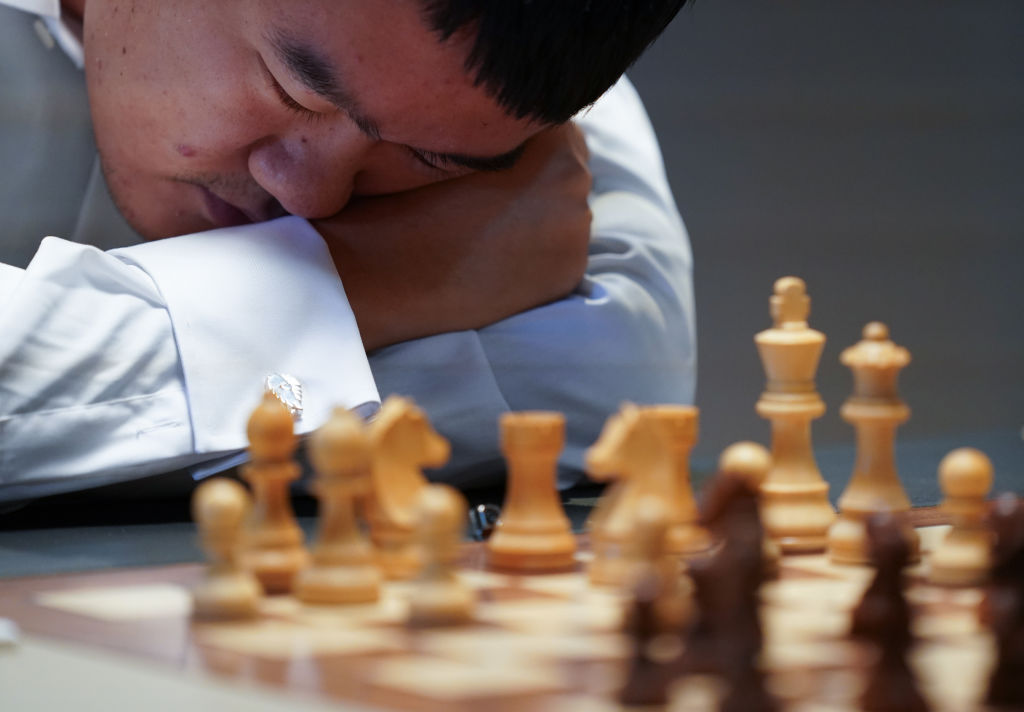The chess world championship title goes on the line once again starting this Monday, where the incumbent Ding Liren will face off against the challenger Gukesh D for the highest title in chess! Playing 14 head-to-head games in Singapore over two and a half weeks, Ding is looking to correct his post-title form slump, while Gukesh could become the 18th world chess champion at just 18 years of age.
The chess is back! Let’s go!
The Players
The last time we checked in with our man Ding Liren, he had become the first ever undisputed Chinese world chess champion after a rollercoaster tiebreak victory over Ian Nepomniachtchi in Astana 18 months ago. (The world championship cycle normally lasts two years, but we’re having matches in back-to-back years to correct the interruption brought on by the COVID pandemic.)
The intense preparation and pressure of the match took a toll on the champ, and he thereafter took eight months away from the board, and so far has played dreadfully in 2024. He’s finished with a minus score in all five classical events he’s played since becoming champion, notching up just three wins in 49 classical games over that period, including zero wins since January as he’s bageled the W column in his last three tournaments. Ding has dropped to world No. 23—a ranking frankly unbecoming for a world champion, having lost 60 rating points since he won the title, with his rating of 2728 his lowest rating in more than 10 years.
To hear Ding speak about his journey since winning the title is crushing: He’s said that after the match he couldn’t sleep well, which led to depression and him being treated in a clinic twice. Earlier this year, he said, “It doesn’t seem like I’ve been playing the way I used to … I don’t know if I will ever reach that level again.” World Champion Emeritus Magnus Carlsen, showing his trademark tact, said that Ding looked like he could be “permanently broken,” while Hikaru Nakamura stated that Ding was “bouncing up and down and shaking” at the board. The low point came when Ding missed a mate-in-two against Carlsen later in Norway in June, a beginner’s tactic that you or I would not have missed, potentially the worst blunder ever made in a classical game by an incumbent world champion.
It’s heartbreaking, because Ding is a terrific player and a genuinely nice human. However, while he doesn’t have form on his side, if he can survive the first few games in the match I suspect he might find his rhythm and be able to stabilize. Having gone through the rigors of a three-week match before, he might find himself more able to stay centered when the fatigue and pressure start to take their toll.
By contrast, the challenger Gukesh has been balling out of control in 2024. He won the Candidates Tournament in style to qualify for this match, and then led India to the victory in the Chess Olympiad in Budapest in September as he won gold on Board 1 for the second consecutive time(!) with a ridiculous 3056 total performance rating.
Gukesh is the epitome of a chess prodigy—he achieved his Grandmaster title in 2019 at 12 years and 7 months of age, missing out on becoming the youngest GM of all time by two and a half weeks. He’s now climbed to world No. 5—as the youngest player in the world’s top 100—and the youngest-ever world championship challenger. Gukesh would take Garry Kasparov’s mantle as the youngest undisputed world champion even if he lost this and the next match and came back to win the title any time before Christmas 2028.
The Chess World is Changing
With the growth of chess’s popularity and accessibility, it has taken hold across different parts of the globe. Not only is this the first world championship match between two players from Asia, the world’s top 30 now features six Indian and four Chinese players, with only one (our old friend Ian Nepomniachtchi himself) from Russia, the dominant chess force throughout the 20th century.
Much of the credit for the emergence of India as a chess juggernaut can be directed to one trailblazer. Viswanathan Anand became India’s first-ever grandmaster in 1988, and challenged Garry Kasparov for the world title atop the World Trade Center in 1995. He became undisputed world champion in 2007 and defended the title three times, becoming a superstar in India. It’s no exaggeration to say that India is now one of the strongest chess nations: there are now 85 Grandmasters from India (fifth-most of any country), with strong representation in the open, women’s, and juniors rankings lists, and Narendra Modi and Sachin Tendulkar routinely congratulate Indian chess players on outstanding performances. India swept to a double-gold in the open and women’s competitions at this year’s Olympiad, and had two players in both the open and women’s Candidates’ tournaments. Many of India’s “golden generation” have trained at the Soviet-style chess academy that Anand established in 2020 in Chennai, including Gukesh, Arjun Erigaisi, and the brother-sister duo of Praggnanandhaa and Vaishali Rameshbabu. More informal accounts describe small local tournaments exploding in popularity. It all bodes well for the future of chess in India.
And Vishy isn’t done yet—although the youngs are taking over the game of chess, with four of the world’s top 10 and three more in the top 20 born this century, the semi-retired Anand is still world No. 10, at age 54!
In China, by contrast, Ding is a relative unknown—as he has pointed out, Go and Xiangqi (“Chinese chess”) are more popular in China, and as a result he’s nowhere near as well-known as table tennis stars like Ma Long or Fan Zhendong. The guy only has about 20,000 followers on social media!
On the Board
What can we expect to see during the match? Modern chess players are universal and can play any opening, and both of these guys are crafty thinkers, so that we should expect some intricate theoretical battles in the early phases of each game. Ding opened with only 1.d4 and 1.c4 in the match against Nepomniachtchi, so we’ll have the potential to see Gukesh play some versions of the Nimzo-Indian with the black pieces, while with white Gukesh might open up with 1.Nf3, keeping his options open for a move and inviting Ding to nudge the game in his preferred direction.
Each player will have a team of seconds who have been working away for months, looking for new and untested ideas in different nooks and crannies of opening theory, hoping to catch their opponent unprepared and ensuring that that won’t in turn happen to them. Gukesh has stated that Grzegorz Gajewski will lead his team, and hopefully Ding and Richard Rapport—another guy who prefers to be doing anything other than playing chess—will reunite after their adorable friendship captivated at last year’s championship. Ding has said that for his 2023 match against Nepomniachtchi he started his preparation “at the last moment” and that he would “probably” start earlier this time. Good idea, I’d say!
When Ding is on form he’s perhaps the best calculator in the game of chess, often finding his way out of sticky positions where all looks to be lost. Gukesh, like many of the new generation, is aggressive (Anand described Gukesh as a well-mannered kid, “but not on the chessboard”), and will push for a win if he senses the slightest edge.
The players have played only three times before in classical chess, with Ding winning both times he has had the black pieces against Gukesh—one of those being one his rare wins this year, a nice attacking victory back in January.
As with many competitive endeavors, this match could be won or lost between the ears. Ding hasn’t forgotten how to play chess, but he hasn’t shown that he’s capable of finding his best form so far this year. Gukesh, on the other hand, is known to be a very calm and level-headed competitor, but will be brimming with confidence given how his 2024 has gone. It could go either way: if Gukesh wins, it’ll be the story of a fearless teenage juggernaut against an older player who knew his time had come, while if Ding wins, it’ll be the story of a reckless inexperienced pretender against a wily champion.
Chess’s Age of Suspicion
What’s the first thing that comes to your mind when you think of chess in 2024? I’d wager that I can guess, without even receiving any outside assistance.
Cheating has always been a part of every competitive human endeavor, and chess has always had its scandals—from the Mechanical Turk hoax to Viktor Korchnoi accusing Anatoly Karpov of having his team deliver him different-colored yoghurt as a mid-game refreshment depending on which move they were telling him to play. In the modern era, the tools for cheating have never been more readily available.
The fact that chess engines are stronger than the best human players is no more noteworthy than a car moving faster than Usain Bolt. Deep Blue’s defeat of Garry Kasparov in 1997 (after Kasparov had won their first head-to-head the year before) truly deserves to stand as a signal achievement in the development of computer science to be written about in textbooks years from now, but it was inevitable that it would happen at some point.
The game has evolved from one of trying to defeat the machines to using them as training aids—and they are indispensable in the modern game, particularly for opening preparation. Players in the pre-computer era had no choice but to stare at a position and think, for hours and hours, to calculate and to analyze and to continuously interrogate the pros and cons of different plans. In the age of the chess engine and bullet chess, newer players may not develop these same habits. The first instinct may be to always ask the engine for the “correct” answer. After all, isn’t that more efficient?
The parallels with the emergence artificial intelligence are obvious. ChatGPT and its ilk can have legitimate benefits, but also have the potential to teach its users to always delegate thinking to the machines in the name of “working smarter.” A person who becomes accustomed to asking a machine for the correct answer as a first instinct will see their critical thinking skills atrophy, but may also begin to see nothing wrong with obeying that instinct even when it is banned—isn’t it smarter to work around a rule which prevents me from operating at an optimal level?
Flagrant cases aside, cheating in over-the-board tournaments is mercifully rare, because if you want to go over and above just hiding your phone in the bathroom, you’re going to have to create a spyware device that can avoid detection, find a willing co-conspirator to feed you the moves and work out a code to do so, and then after splitting the $100 prize money from your local under-2100 ELO chess tournament, you’ll probably wish you’d baked some cookies instead.
The Hans Niemann cheating scandal broke into the mainstream because it had all the necessary ingredients of a good story: a salacious accusation, a cartoonish villain, and a sexual angle. Lost in the whirlwind was that it was tremendously amplified by a smear campaign from a publicity-seeking company which had nothing to do with the event in question. When Magnus Carlsen sensationally withdrew from the Sinquefield Cup in September 2022 after an over-the-board classical loss to Niemann, Chess.com needed a way to insert itself into the story. In the absence of any evidence that Niemann had cheated against Carlsen, it decided to ban Niemann from its site and rescind an invitation to an upcoming online tournament on the basis of prior instances of Niemann’s online cheating which had occurred years earlier, when he was between 12 and 17 years old, for which Niemann had already been punished. Positioning itself as the guardian against unethical actions in chess, the company put together a 72-page report summarizing its opinion regarding the extent of Niemann’s childhood online cheating—something it has not done for any cheater before or since—leaking the report to the Wall Street Journal for maximum exposure. Two years later, and none of the protagonists now maintain that Niemann cheated against Carlsen, but Niemann’s reputation is mud as his name has become irreparably linked with the C-word. No matter: as its CEO Erik Allebest said on a podcast this year, the scandal “put the chess world on the map again for the biggest chess boom that we’ve ever had.”
As some continue to claim that cheating is an existential threat to chess, former world champion Vladimir Kramnik has turned into something of a truth-seeker, on a one-man crusade to publicly accuse just about every high level player of using engine assistance, from Hikaru Nakamura to Nihal Sarin to Daniel Naroditsky, introducing some extremely voluminous home-cooked statistical analysis to back up his points. Kramnik’s continued and numerous public accusations apparently saw him fall afoul of Chess.com’s Community Standards, which blocked his blog and suspended his account on multiple separate occasions.
We can say with as much certainty as reality permits that there will be no cheating during this world championship. But cheating is now as much linked with chess in the public consciousness as it was with baseball or cycling, on the back of far fewer proved examples. Instead of instinctively making as much noise as possible about cheating at every turn, maybe the chess community needs to stop and think.
Practical information
Singapore beat out competing bids from New Delhi and Chennai to host the match. The players will face off at the 5-star Equarius Hotel, on Sentosa Island off the south coast.
Starting on Monday, the match is a best-of-14 affair (the players need to play an equal number of games with each colored pieces, to neutralize white’s first-mover advantage), plus a day of shorter-format tiebreaks, if required. There’s one game per day, with rest days after every third game.
The games start at 17:00 Singapore time, which translates to 4:00 a.m. on the east coast of your United States—a perfect time for new parents and baking apprentices. (The games usually last for a few hours each, so you can check in once you’re up and about.)
The players have 120 minutes to make their first 40 moves, and then an additional 30 minutes plus 30 seconds per move to carry them to the end of the game. The total prize fund is $2.5 million, with the players receiving $200,000 for each game they win, and sharing the balance between them (or, if the match goes to tiebreaks, splitting it $1.3 million to $1.2 million—you know, the normal 52:48 ratio.)
We’ll have coverage right here at Defector dot com, with recaps of the games coming at the halfway point and at the conclusion of the match. During each game, you can follow along with the players’ moves on your app or website of choice (I recommend Lichess), and there will be no shortage of streamers giving their analysis online.
Can Ding do a Ronnie O’Sullivan and defend world title after barely playing since the last world championship? Or will Gukesh fulfil what appears to be his destiny and usher in a new era in chess? There’s only one way to find out!
It’s the World Chess Championship 2024, folks. Get on board!






